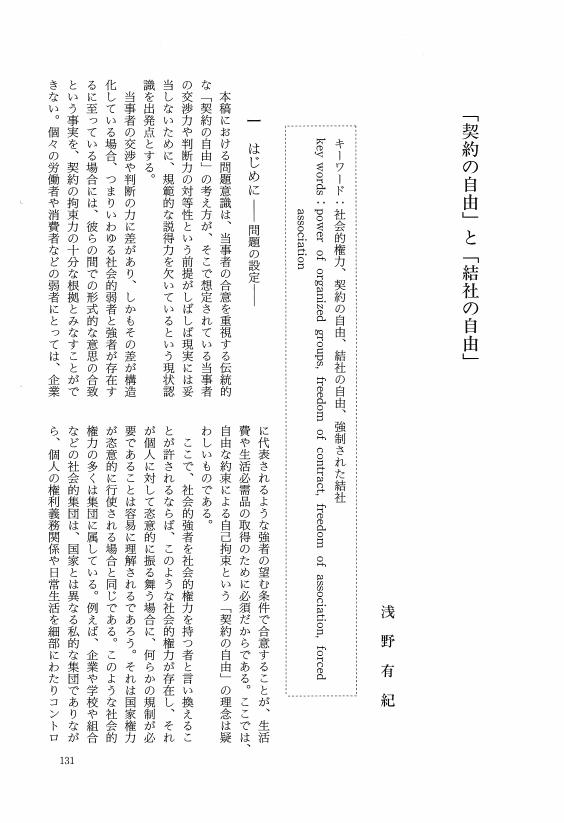2 0 0 0 OA 認知科学と哲学の対話
- 著者
- 川野 洋
- 出版者
- 日本科学哲学会
- 雑誌
- 科学哲学 (ISSN:02893428)
- 巻号頁・発行日
- vol.16, pp.1-4, 1983-11-26 (Released:2009-05-29)
2 0 0 0 OA エアランゲン学派と心理学思想 科学哲学および実践哲学と心理学との関係
- 著者
- 菅原 道明
- 出版者
- 日本科学哲学会
- 雑誌
- 科学哲学 (ISSN:02893428)
- 巻号頁・発行日
- vol.16, pp.85-98, 1983-11-26 (Released:2009-05-29)
2 0 0 0 OA 様相述語体系の一階述語論理への埋め込みについて
- 著者
- 三浦 聰
- 出版者
- 日本科学哲学会
- 雑誌
- 科学哲学 (ISSN:02893428)
- 巻号頁・発行日
- vol.15, pp.107-121, 1982-11-13 (Released:2009-05-29)
- 参考文献数
- 5
2 0 0 0 OA 論理的真理と文の構造
- 著者
- 信原 幸弘
- 出版者
- 日本科学哲学会
- 雑誌
- 科学哲学 (ISSN:02893428)
- 巻号頁・発行日
- vol.14, pp.75-88, 1981-11-10 (Released:2009-05-29)
2 0 0 0 OA ブラウアーの命題様相体系Bにかんする幾つかの問題
- 著者
- 内田 種臣
- 出版者
- 日本科学哲学会
- 雑誌
- 科学哲学 (ISSN:02893428)
- 巻号頁・発行日
- vol.10, pp.55-63, 1977-11-10 (Released:2009-05-29)
- 参考文献数
- 11
2 0 0 0 OA 様相パラドックス
- 著者
- 内井 惣七
- 出版者
- 日本科学哲学会
- 雑誌
- 科学哲学 (ISSN:02893428)
- 巻号頁・発行日
- vol.9, pp.15-26, 1976-11-10 (Released:2009-05-29)
2 0 0 0 OA 様相論理のモデル理論と存在および同一性の問題
- 著者
- 野本 和幸
- 出版者
- 日本科学哲学会
- 雑誌
- 科学哲学 (ISSN:02893428)
- 巻号頁・発行日
- vol.9, pp.27-39, 1976-11-10 (Released:2009-05-29)
2 0 0 0 OA 現象学と分析哲学 フッサールとフレーゲ
- 著者
- 内田 種臣
- 出版者
- 日本科学哲学会
- 雑誌
- 科学哲学 (ISSN:02893428)
- 巻号頁・発行日
- vol.6, pp.18-28, 1973 (Released:2009-05-29)
2 0 0 0 OA 命題論理学の系統的分類
- 著者
- 杉原 丈夫
- 出版者
- 日本科学哲学会
- 雑誌
- 科学哲学 (ISSN:02893428)
- 巻号頁・発行日
- vol.5, pp.95-109, 1972-12-25 (Released:2009-05-29)
- 参考文献数
- 4
2 0 0 0 OA 科学史と科学哲学の融合 アメリカ科学哲学界の一傾向
- 著者
- 伊東 俊太郎
- 出版者
- 日本科学哲学会
- 雑誌
- 科学哲学 (ISSN:02893428)
- 巻号頁・発行日
- vol.5, pp.13-19, 1972-12-25 (Released:2009-05-29)
2 0 0 0 OA ガダマーの哲学的解釈学と現代ドイツの法哲学
- 著者
- 竹下 賢
- 出版者
- 日本法哲学会
- 雑誌
- 法哲学年報 (ISSN:03872890)
- 巻号頁・発行日
- vol.1997, pp.125-138, 1998-10-30 (Released:2009-02-12)
- 参考文献数
- 24
2 0 0 0 OA 現代ドイツにおける宗教と法
- 著者
- 初宿 正典
- 出版者
- 日本法哲学会
- 雑誌
- 法哲学年報 (ISSN:03872890)
- 巻号頁・発行日
- vol.2002, pp.86-97, 2003-10-20 (Released:2008-11-17)
- 参考文献数
- 11
2 0 0 0 OA 山田・乎野・亀本報告へのコメント実定法学の立場から
- 著者
- 道垣内 弘人
- 出版者
- 日本法哲学会
- 雑誌
- 法哲学年報 (ISSN:03872890)
- 巻号頁・発行日
- vol.2006, pp.128-133,263, 2007-10-30 (Released:2010-12-16)
What are the characteristics of legal thinking is a fundamental but difficult problem to answer in legal sciences, including philosophy of law, even if we focus on the way of the interpretation of statutory laws. However, at least, we might say that to keep the consistency of law is one of the most important requirements in the interpretation. What to evade is not only the apparent contradiction in the interpretation but the hidden conflict of different principles, for example, liberalism, libertarianism, paternalism and so on, when we cannot justify the coexistence of principles by the difference of situations. In this context, philosophy of law works as a supplier of tools for analyzing the hidden principles behind legislation, cases and statutory interpretation by academics. The education of philosophy of law as a tools-supplier might have three stages. 1) To teach the principles themselves (e. g. justice theories). 2) To teach the way of analysis. 3) To discuss the relative merits of principles. However, too much emphasis of the importance of philosophy of law sometimes drive the students to settle the cases on the principle which they believe in, without paying attention to the possibility of making other contradiction in the whole system of law. Legal thinking is a restrictive one in the sense that they should respect the firmly established rules.
2 0 0 0 OA メタ倫理学的自然主義再考 価値論と人間科学
- 著者
- 内藤 淳
- 出版者
- 日本法哲学会
- 雑誌
- 法哲学年報 (ISSN:03872890)
- 巻号頁・発行日
- vol.2005, pp.135-143,195, 2006-10-30 (Released:2010-02-15)
- 参考文献数
- 5
Normative judgments and their criteria are generally excluded as subjects of science on account of the dualism of facts and values. Meta-ethical naturalism, which attempts to present criteria for values in terms of facts, is therefore regarded as a fallacy. However, as normative judgments are produced through the workings of the mind of each individual, we may find some clues for examining the foundations or criteria of our normative judgments by analyzing the process of the working of our minds by scientific methods and thereby discovering its basic rules. This means that ethical problems can be approached and solved in the field of human science. Indeed, we can find some useful scientific knowledge related to meta-ethical problems. For example, it has been demonstrated in some studies of cognitive psychology that judgments on moral values are decided by intuition, which is an emotional reaction, rather than by rational thinking. And according to recent research in evolutionary psychology, emotions function in order to gain benefits for each person in their reciprocal relationships with others. These scientific studies suggest that the ultimate foundation of normative judgments is in human intuition as an emotional reaction and the ultimate criterion of “good/bad” or “right/wrong” is whether it is beneficial to the individual in his/her reciprocal relationships with others. While there remains much scope for further verification, these studies suggest that it is possible to examine meta-ethical problems by scientific methods and support meta-ethical naturalism, which presents the foundations and criteria for normative values through factual statements.
2 0 0 0 OA 権威と原意—ジョセフ・ラズの解釈論と原意主義
- 著者
- 丸 祐一
- 出版者
- 日本法哲学会
- 雑誌
- 法哲学年報 (ISSN:03872890)
- 巻号頁・発行日
- vol.2002, pp.183-192, 2003-10-20 (Released:2008-11-17)
- 参考文献数
- 43
- 著者
- 瀬戸山 晃一
- 出版者
- 日本法哲学会
- 雑誌
- 法哲学年報 (ISSN:03872890)
- 巻号頁・発行日
- vol.2002, pp.131-140, 2003-10-20 (Released:2008-11-17)
- 参考文献数
- 15
2 0 0 0 OA 宗教と法-聖と俗の比較法文化-非西欧のパースペクティヴから
- 著者
- 千葉 正士
- 出版者
- 日本法哲学会
- 雑誌
- 法哲学年報 (ISSN:03872890)
- 巻号頁・発行日
- vol.2002, pp.29-43, 2003-10-20 (Released:2008-11-17)
- 参考文献数
- 29
2 0 0 0 OA 宗教と法-キリスト教のパースペクティブから
- 著者
- ホセ・ヨンパルト
- 出版者
- 日本法哲学会
- 雑誌
- 法哲学年報 (ISSN:03872890)
- 巻号頁・発行日
- vol.2002, pp.8-20, 2003-10-20 (Released:2008-11-17)
- 参考文献数
- 1
2 0 0 0 OA 「契約の自由」と「結社の自由」
- 著者
- 浅野 有紀
- 出版者
- 日本法哲学会
- 雑誌
- 法哲学年報 (ISSN:03872890)
- 巻号頁・発行日
- vol.2001, pp.131-138, 2002-10-30 (Released:2008-11-17)
- 参考文献数
- 10
2 0 0 0 OA 情報化社会における内部告発と法—原発事故、医療過誤を例に—
- 著者
- 青野 透
- 出版者
- 日本法哲学会
- 雑誌
- 法哲学年報 (ISSN:03872890)
- 巻号頁・発行日
- vol.2001, pp.102-106, 2002-10-30 (Released:2008-11-17)
- 参考文献数
- 16

















